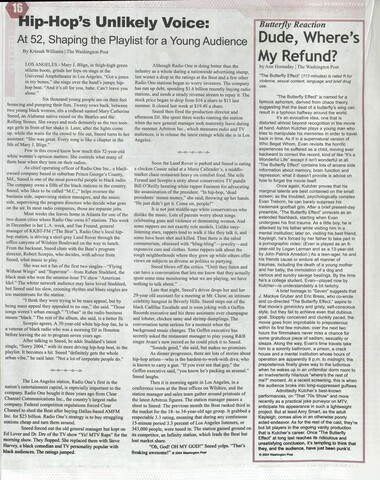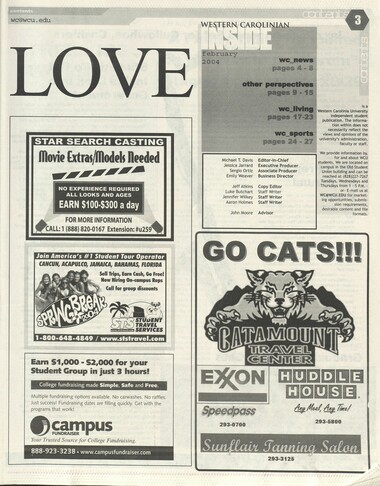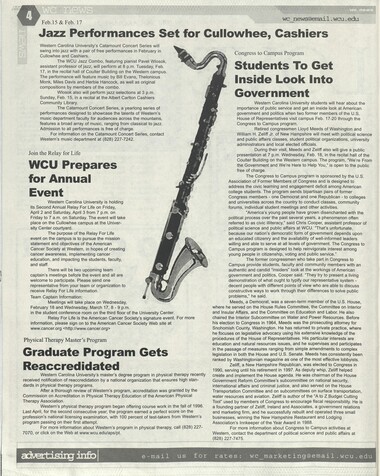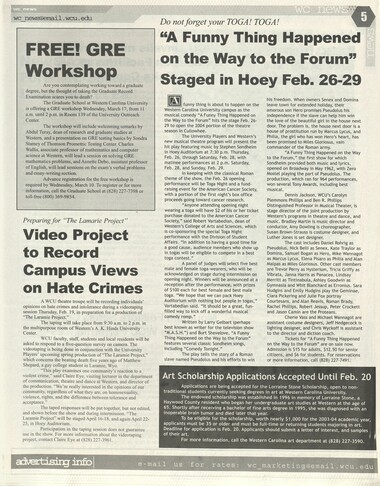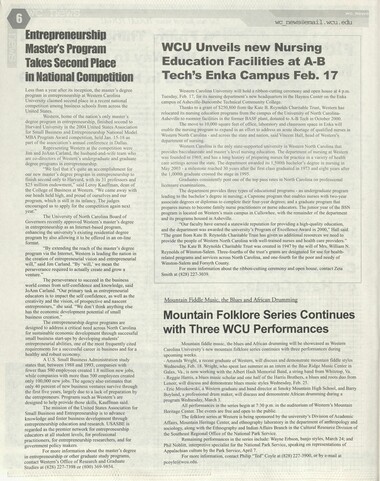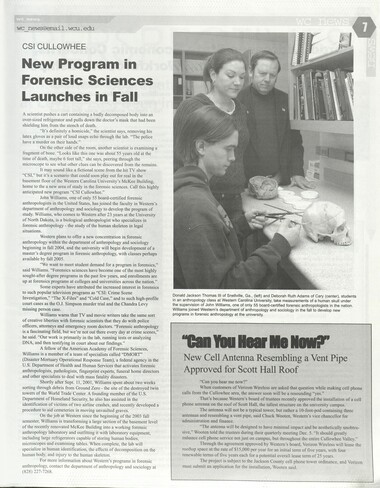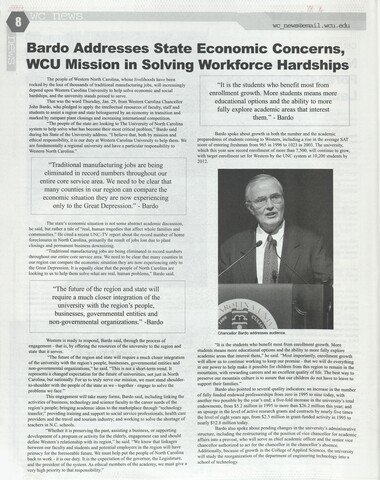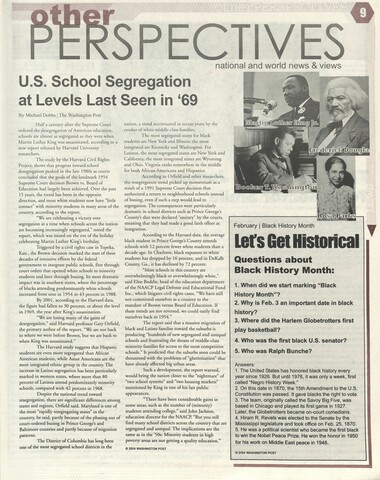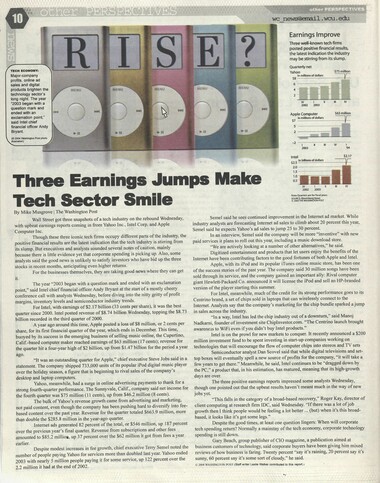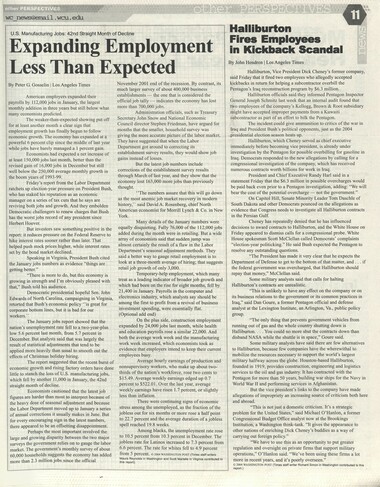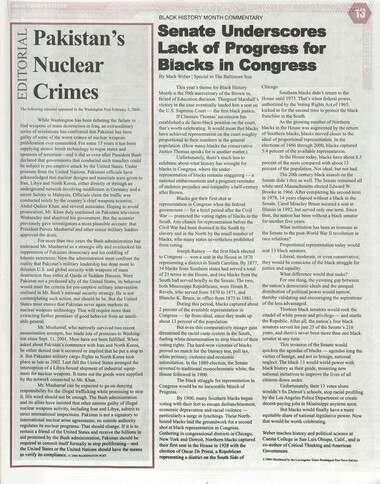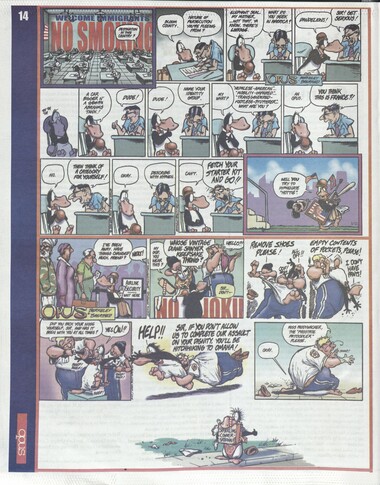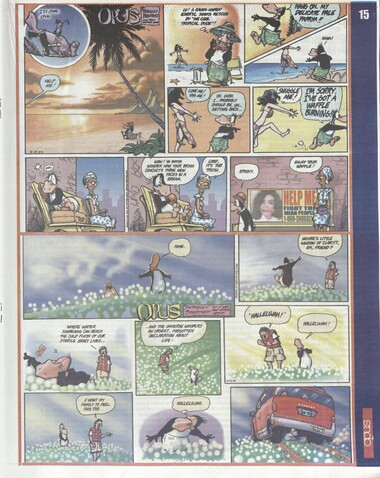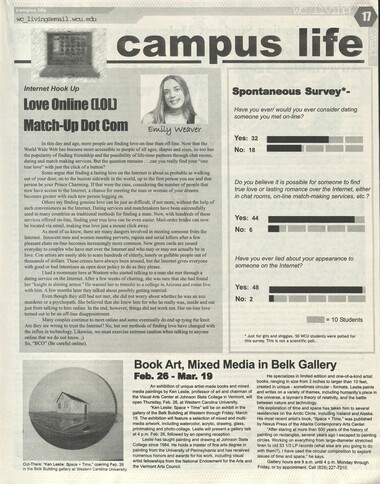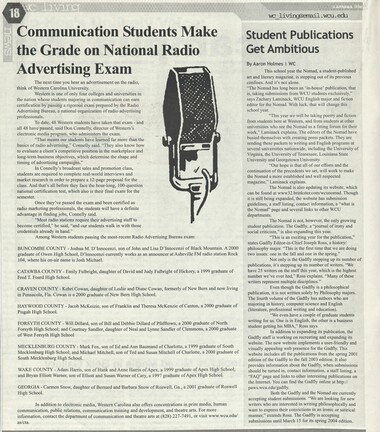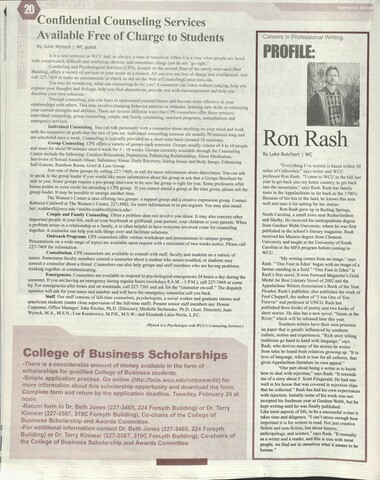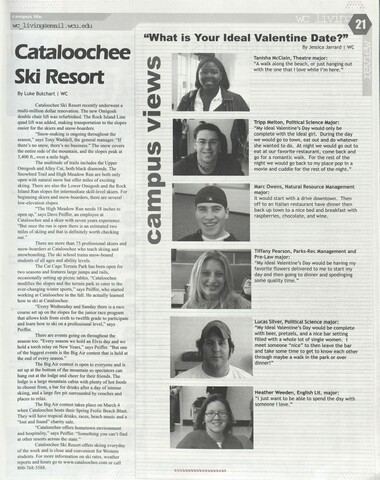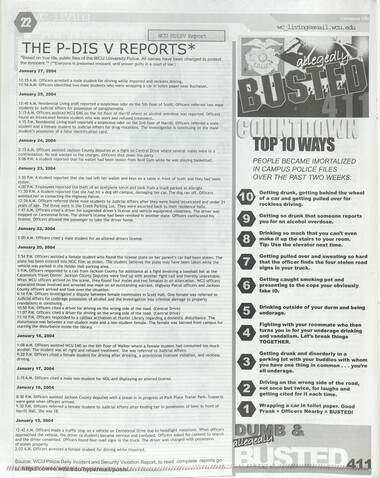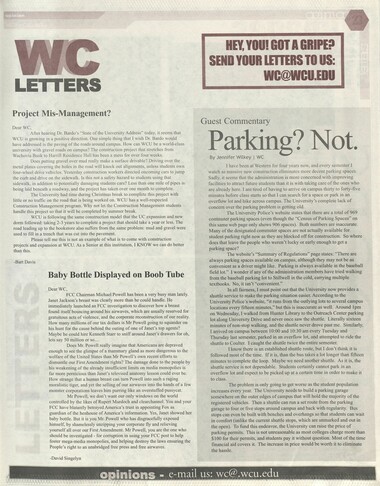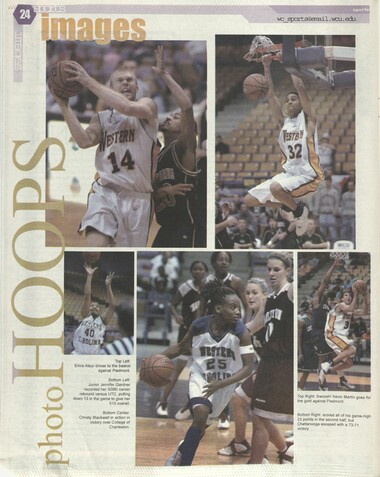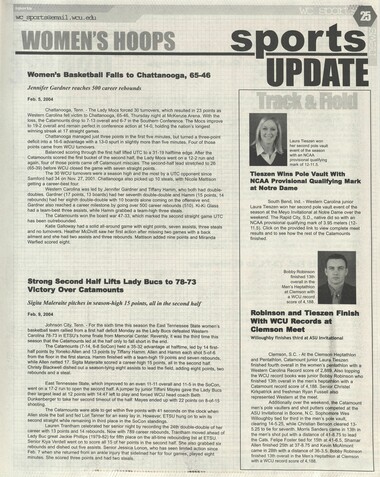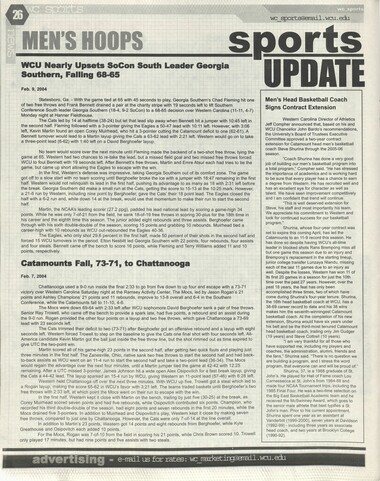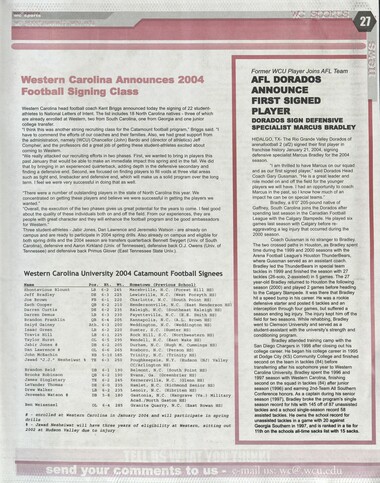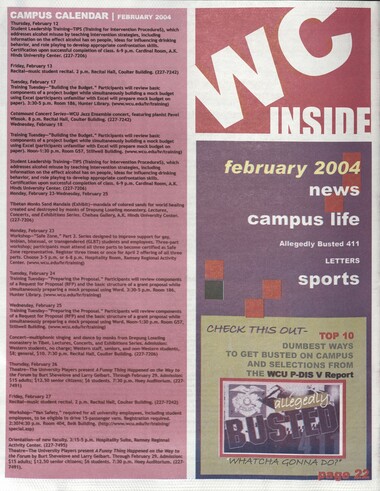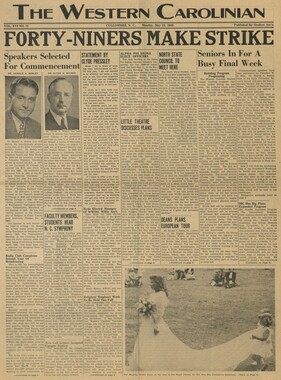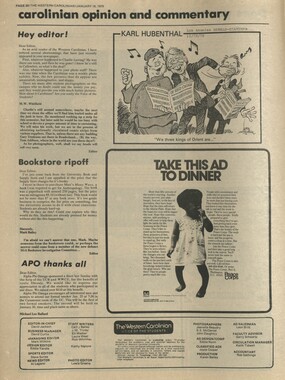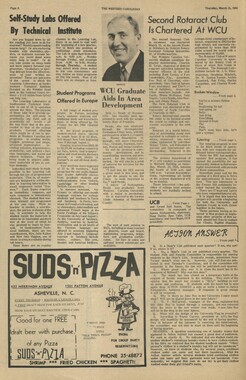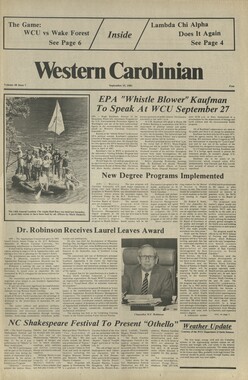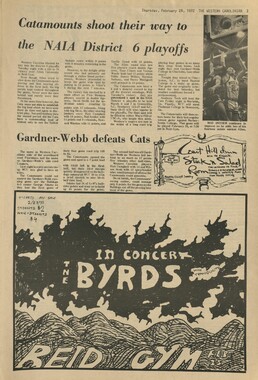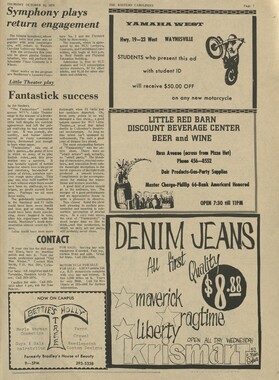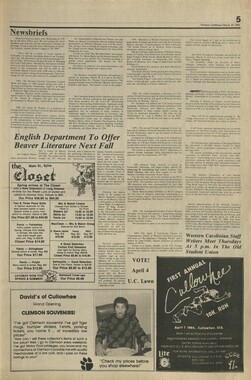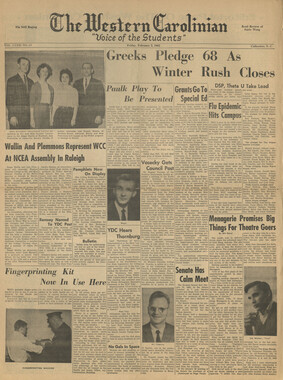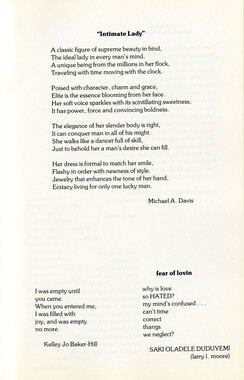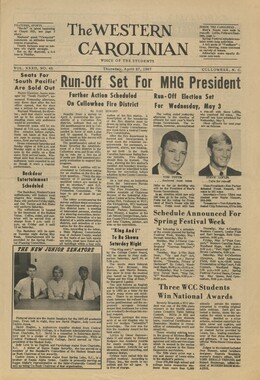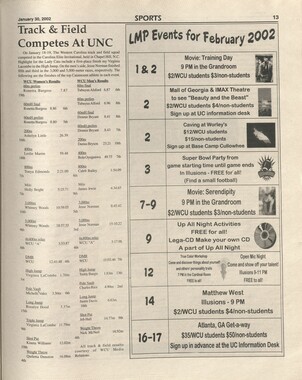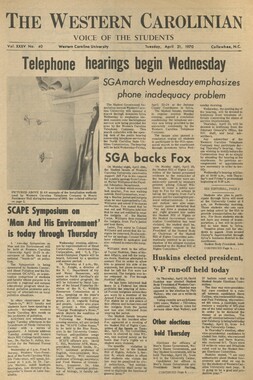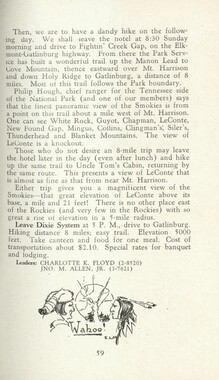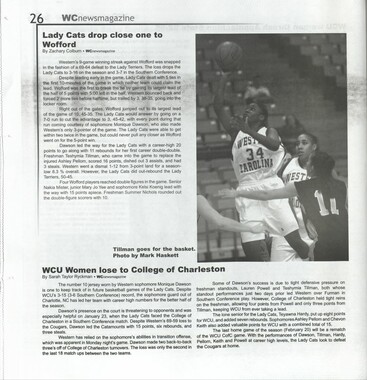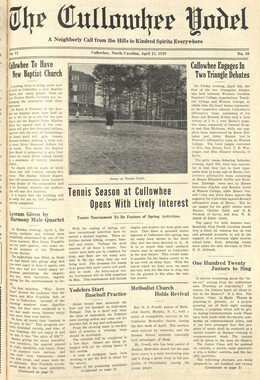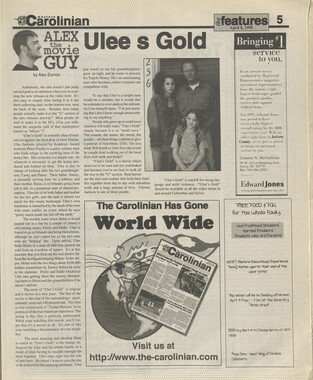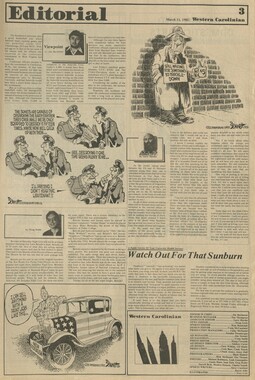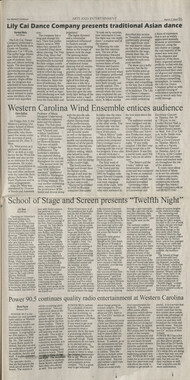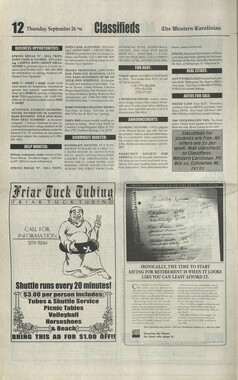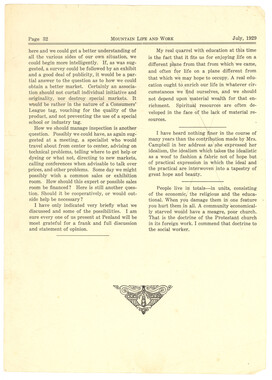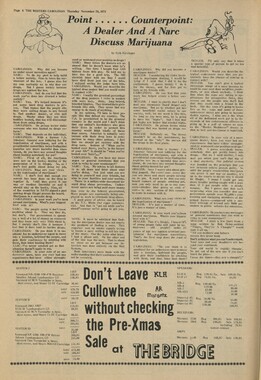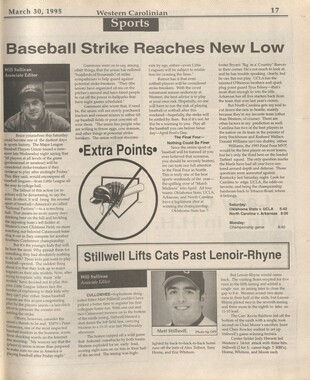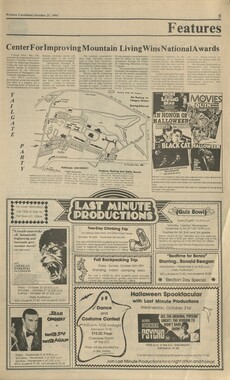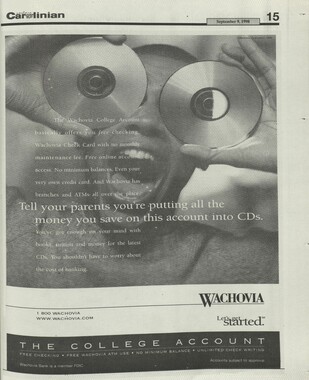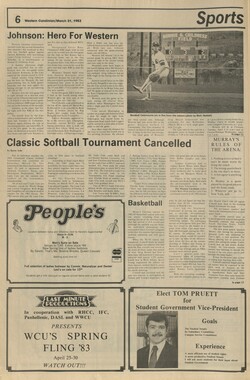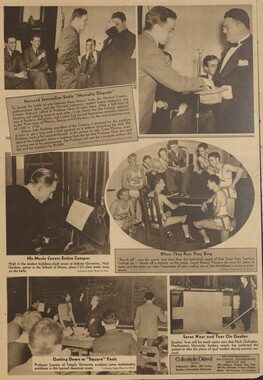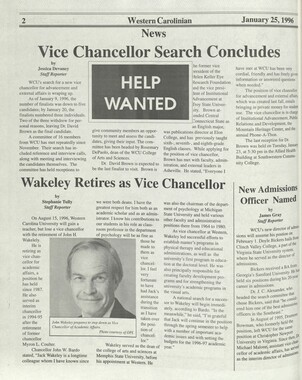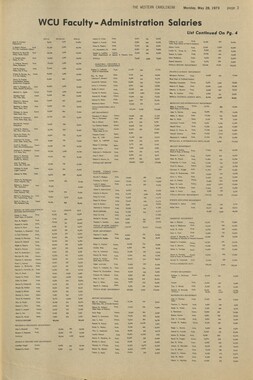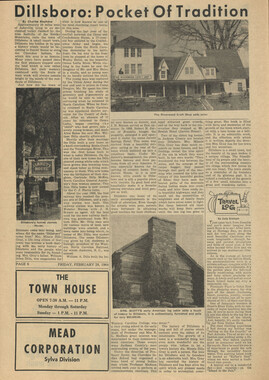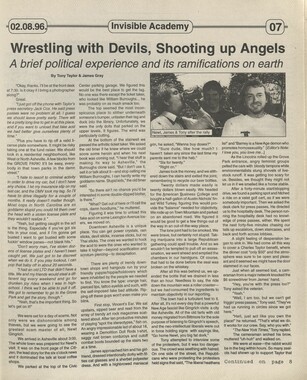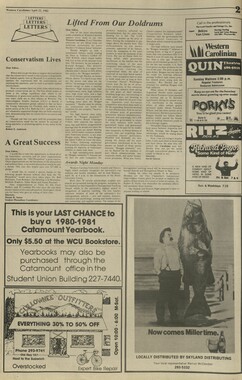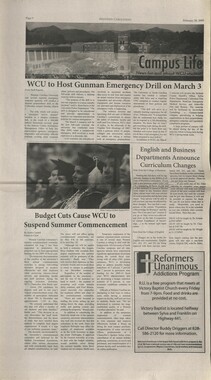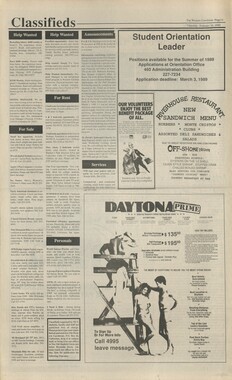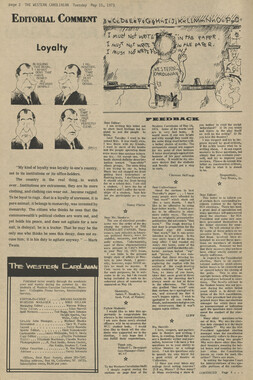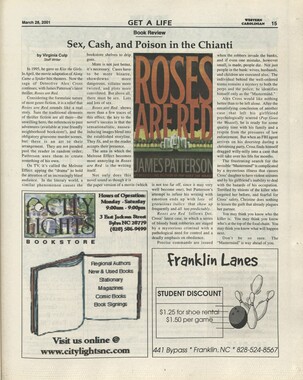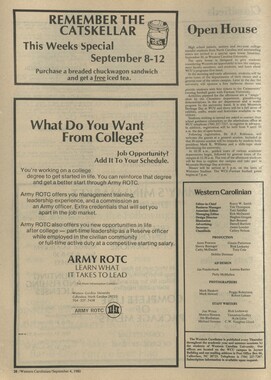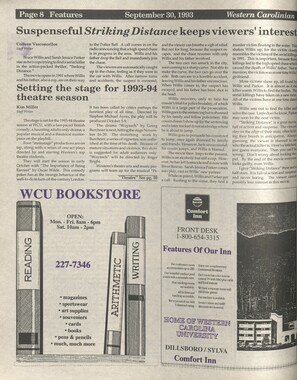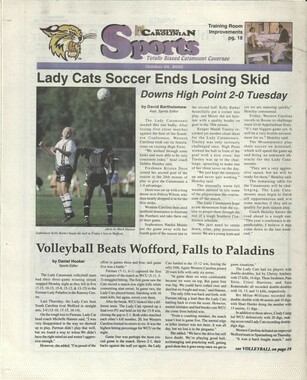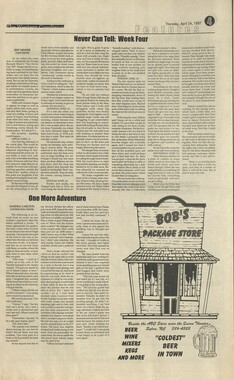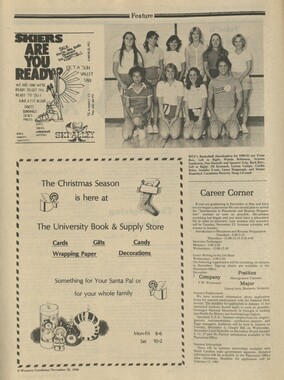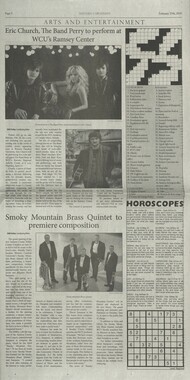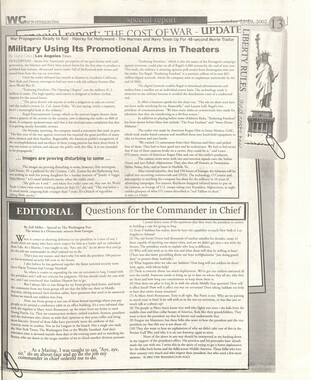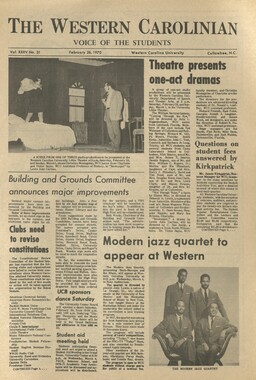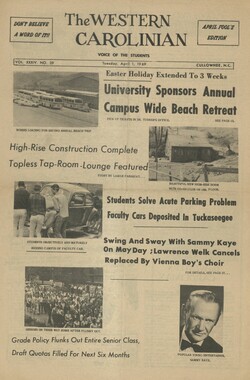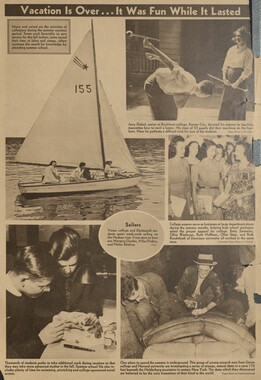Western Carolina University (21)
View all
- Canton Champion Fibre Company (2308)
- Cherokee Traditions (291)
- Civil War in Southern Appalachia (165)
- Craft Revival (1942)
- George Masa Collection (137)
- Great Smoky Mountains - A Park for America (3080)
- Highlights from Western Carolina University (422)
- Horace Kephart (973)
- Journeys Through Jackson (159)
- LGBTQIA+ Archive of Jackson County (89)
- Oral Histories of Western North Carolina (318)
- Picturing Appalachia (6617)
- Stories of Mountain Folk (413)
- Travel Western North Carolina (153)
- Western Carolina University Fine Art Museum Vitreograph Collection (129)
- Western Carolina University Herbarium (92)
- Western Carolina University: Making Memories (738)
- Western Carolina University Publications (2491)
- Western Carolina University Restricted Electronic Theses and Dissertations (146)
- Western North Carolina Regional Maps (71)
- World War II in Southern Appalachia (131)
University of North Carolina Asheville (6)
View all
- Allanstand Cottage Industries (62)
- Appalachian National Park Association (53)
- Bennett, Kelly, 1890-1974 (1463)
- Berry, Walter (76)
- Brasstown Carvers (40)
- Carver, George Washington, 1864?-1943 (26)
- Cathey, Joseph, 1803-1874 (1)
- Champion Fibre Company (233)
- Champion Paper and Fibre Company (297)
- Cherokee Indian Fair Association (16)
- Cherokee Language Program (22)
- Crowe, Amanda (40)
- Edmonston, Thomas Benton, 1842-1907 (7)
- Ensley, A. L. (Abraham Lincoln), 1865-1948 (275)
- Fromer, Irving Rhodes, 1913-1994 (70)
- George Butz (BFS 1907) (46)
- Goodrich, Frances Louisa (120)
- Grant, George Alexander, 1891-1964 (96)
- Heard, Marian Gladys (60)
- Kephart, Calvin, 1883-1969 (15)
- Kephart, Horace, 1862-1931 (313)
- Kephart, Laura, 1862-1954 (67)
- Laney, Gideon Thomas, 1889-1976 (439)
- Masa, George, 1881-1933 (61)
- McElhinney, William Julian, 1896-1953 (44)
- Niggli, Josephina, 1910-1983 (10)
- North Carolina Park Commission (105)
- Osborne, Kezia Stradley (9)
- Owens, Samuel Robert, 1918-1995 (11)
- Penland Weavers and Potters (36)
- Roberts, Vivienne (15)
- Roth, Albert, 1890-1974 (142)
- Schenck, Carl Alwin, 1868-1955 (1)
- Sherrill's Photography Studio (2565)
- Southern Highland Handicraft Guild (127)
- Southern Highlanders, Inc. (71)
- Stalcup, Jesse Bryson (46)
- Stearns, I. K. (213)
- Thompson, James Edward, 1880-1976 (226)
- United States. Indian Arts and Crafts Board (130)
- USFS (683)
- Vance, Zebulon Baird, 1830-1894 (1)
- Weaver, Zebulon, 1872-1948 (58)
- Western Carolina College (230)
- Western Carolina Teachers College (282)
- Western Carolina University (2008)
- Western Carolina University. Mountain Heritage Center (18)
- Whitman, Walt, 1819-1892 (10)
- Wilburn, Hiram Coleman, 1880-1967 (73)
- Williams, Isadora (3)
- Cain, Doreyl Ammons (0)
- Crittenden, Lorraine (0)
- Rhodes, Judy (0)
- Smith, Edward Clark (0)
- Appalachian Region, Southern (3032)
- Asheville (N.C.) (1945)
- Avery County (N.C.) (26)
- Blount County (Tenn.) (195)
- Buncombe County (N.C.) (1680)
- Cherokee County (N.C.) (283)
- Clay County (N.C.) (556)
- Graham County (N.C.) (238)
- Great Smoky Mountains National Park (N.C. and Tenn.) (525)
- Haywood County (N.C.) (3573)
- Henderson County (N.C.) (70)
- Jackson County (N.C.) (4925)
- Knox County (Tenn.) (35)
- Knoxville (Tenn.) (13)
- Lake Santeetlah (N.C.) (10)
- Macon County (N.C.) (421)
- Madison County (N.C.) (216)
- McDowell County (N.C.) (39)
- Mitchell County (N.C.) (135)
- Polk County (N.C.) (35)
- Qualla Boundary (982)
- Rutherford County (N.C.) (78)
- Swain County (N.C.) (2185)
- Transylvania County (N.C.) (270)
- Watauga County (N.C.) (12)
- Waynesville (N.C.) (86)
- Yancey County (N.C.) (72)
- Aerial Photographs (3)
- Aerial Views (60)
- Albums (books) (4)
- Articles (1)
- Artifacts (object Genre) (228)
- Bibliographies (1)
- Biography (general Genre) (2)
- Cards (information Artifacts) (38)
- Clippings (information Artifacts) (192)
- Copybooks (instructional Materials) (3)
- Crafts (art Genres) (622)
- Depictions (visual Works) (21)
- Design Drawings (1)
- Digital Moving Image Formats (2)
- Drawings (visual Works) (185)
- Envelopes (101)
- Exhibitions (events) (1)
- Facsimiles (reproductions) (1)
- Fiction (general Genre) (4)
- Financial Records (12)
- Fliers (printed Matter) (67)
- Glass Plate Negatives (381)
- Guidebooks (2)
- Internegatives (10)
- Interviews (823)
- Land Surveys (102)
- Letters (correspondence) (1045)
- Manuscripts (documents) (618)
- Maps (documents) (177)
- Memorandums (25)
- Minutes (administrative Records) (59)
- Negatives (photographs) (6090)
- Newsletters (1290)
- Newspapers (2)
- Notebooks (8)
- Occupation Currency (1)
- Paintings (visual Works) (1)
- Pen And Ink Drawings (1)
- Periodicals (194)
- Personal Narratives (10)
- Photographs (12977)
- Plans (maps) (1)
- Poetry (6)
- Portraits (4568)
- Postcards (329)
- Programs (documents) (181)
- Publications (documents) (2444)
- Questionnaires (65)
- Relief Prints (26)
- Sayings (literary Genre) (1)
- Scrapbooks (282)
- Sheet Music (2)
- Slides (photographs) (402)
- Songs (musical Compositions) (2)
- Sound Recordings (802)
- Specimens (92)
- Speeches (documents) (18)
- Tintypes (photographs) (8)
- Transcripts (329)
- Text Messages (0)
- A.L. Ensley Collection (275)
- Appalachian Industrial School Records (7)
- Appalachian National Park Association Records (336)
- Axley-Meroney Collection (2)
- Bayard Wootten Photograph Collection (20)
- Bethel Rural Community Organization Collection (7)
- Blumer Collection (5)
- C.W. Slagle Collection (20)
- Canton Area Historical Museum (2110)
- Carlos C. Campbell Collection (462)
- Cataloochee History Project (64)
- Cherokee Studies Collection (4)
- Daisy Dame Photograph Album (5)
- Daniel Boone VI Collection (1)
- Doris Ulmann Photograph Collection (112)
- Elizabeth H. Lasley Collection (1)
- Elizabeth Woolworth Szold Fleharty Collection (4)
- Frank Fry Collection (95)
- George Masa Collection (173)
- Gideon Laney Collection (452)
- Hazel Scarborough Collection (2)
- Hiram C. Wilburn Papers (28)
- Historic Photographs Collection (236)
- Horace Kephart Collection (861)
- Humbard Collection (33)
- Hunter and Weaver Families Collection (1)
- I. D. Blumenthal Collection (4)
- Isadora Williams Collection (4)
- Jesse Bryson Stalcup Collection (47)
- Jim Thompson Collection (224)
- John B. Battle Collection (7)
- John C. Campbell Folk School Records (80)
- John Parris Collection (6)
- Judaculla Rock project (2)
- Kelly Bennett Collection (1482)
- Love Family Papers (11)
- Major Wiley Parris Civil War Letters (3)
- Map Collection (12)
- McFee-Misemer Civil War Letters (34)
- Mountain Heritage Center Collection (4)
- Norburn - Robertson - Thomson Families Collection (44)
- Pauline Hood Collection (7)
- Pre-Guild Collection (2)
- Qualla Arts and Crafts Mutual Collection (12)
- R.A. Romanes Collection (681)
- Rosser H. Taylor Collection (1)
- Samuel Robert Owens Collection (94)
- Sara Madison Collection (144)
- Sherrill Studio Photo Collection (2558)
- Smoky Mountains Hiking Club Collection (616)
- Stories of Mountain Folk - Radio Programs (374)
- The Reporter, Western Carolina University (510)
- Venoy and Elizabeth Reed Collection (16)
- WCU Gender and Sexuality Oral History Project (36)
- WCU Mountain Heritage Center Oral Histories (25)
- WCU Oral History Collection - Mountain People, Mountain Lives (71)
- WCU Students Newspapers Collection (1923)
- Western North Carolina Tomorrow Black Oral History Project (69)
- William Williams Stringfield Collection (2)
- Zebulon Weaver Collection (109)
- African Americans (390)
- Appalachian Trail (35)
- Artisans (521)
- Cherokee art (84)
- Cherokee artists -- North Carolina (10)
- Cherokee language (21)
- Cherokee pottery (101)
- Cherokee women (208)
- Church buildings (190)
- Civilian Conservation Corps (U.S.) (111)
- College student newspapers and periodicals (2012)
- Dams (108)
- Dance (1023)
- Education (222)
- Floods (63)
- Folk music (1015)
- Forced removal, 1813-1903 (2)
- Forest conservation (220)
- Forests and forestry (1198)
- Gender nonconformity (4)
- Great Smoky Mountains National Park (N.C. and Tenn.) (181)
- Hunting (47)
- Landscape photography (25)
- Logging (122)
- Maps (83)
- Mines and mineral resources (9)
- North Carolina -- Maps (18)
- Paper industry (38)
- Postcards (255)
- Pottery (135)
- Railroad trains (72)
- Rural electrification -- North Carolina, Western (3)
- School integration -- Southern States (2)
- Segregation -- North Carolina, Western (5)
- Slavery (5)
- Sports (452)
- Storytelling (243)
- Waterfalls -- Great Smoky Mountains (N.C. and Tenn.) (66)
- Weaving -- Appalachian Region, Southern (280)
- Wood-carving -- Appalachian Region, Southern (328)
- World War, 1939-1945 (173)
Western Carolinian Volume 68 Number 08
Item
Item’s are ‘child’ level descriptions to ‘parent’ objects, (e.g. one page of a whole book).
-
-
ip-Hops Unlikely Voice: At 52, Shaping the Playlist for a Young Audience By Krissah Williams | The Washington Post LOS ANGELES - Mary J. Blige, in thigh-high green Stiletto boots, grinds her hips on stage at the Universal Amphitheater in Los Angeles. Got a jones in my bones, she sings over the bands jumpy hip- hop beat. And its all for you, babe. Cant leave you alone. Six thousand young people are on their feet bouncing and pumping their fists. Twenty rows back, between two young black women, sits a redhead named Mary Catherine Sneed, an Alabama native raised on the Beatles and the Rolling Stones. She sways and nods demurely as the two teen- age girls in front of her shake it. Later, after the lights come up, while she waits for the crowd to file out, Sneed turns to her assistant: She was great. Every song is like a chapter in the life of Mary J. Blige. Few in this crowd know how much this 52-year-old white womans opinion matters: She controls what many of them hear when they turn on their radios. As chief operating officer of Radio One Inc., a black- owned company based in suburban Prince Georges County, Md., Sneed is one of the most powerful people in black radio. The company owns a fifth of the black stations in the country. Sneed, who likes to be called M.C., helps oversee the business side, supervising station managers, and the music side, supervising the program directors who decide what goes on the air. In most radio companies, those are separate jobs. Most weeks she leaves home in Atlanta for one of the two dozen cities where Radio One owns 67 stations. This week _ in December is her L.A. week, and Sue Freund, general manager of KKBT-FM (The Beat), Radio Ones local hip- hop station, is driving a steel-gray Land Rover through the office canyons of Wilshire Boulevard on the way to lunch. From the backseat, Sneed chats with the Beats program director, Robert Scorpio, who decides, with advice from Sneed, what music to play. She was not a fan of the first two singlesFlying Without Wings and Superstarfrom Ruben Studdard, the black man who won the amateur-hour TV show American Idol. The whiter network audience may have loved Studdard, but Sneed said his slow, crooning rhythm and blues singles are too mainstream for the station. T think they were trying to be mass appeal, but by being mass appeal they appealed to no one, she said. Those songs werent urban enough. Urban in the radio business means black. The rest of the album, she said, is a better fit. Scorpio agrees. A 39-year-old white hip-hop fan, he is a veteran of black radio who was a morning DJ in Houston before leaving the air to program seven years ago. After talking to Sneed, he adds Studdards latest single, Sorry 2004, with its more driving hip-hop beat, to the playlist. It becomes a hit. Sneed definitely gets the whole urban vibe, he said later. Not a lot of corporate people do. -0--00o0- The Los Angeles station, Radio Ones first in the nations entertainment capital, is especially important to the company. Radio One bought it three years ago from Clear __ Channel Communications Inc., the countrys largest radio company. Federal competition regulations forced Clear _ Channel to shed the Beat after buying Dallas-based AMFM Inc. for $23 billion. Radio Ones strategy is to buy struggling | stations cheap and turn them around. Sneed forced out the old general manager but kept on Ed Lover and Dr. Dre of the TV show Yo! MTV Raps for the morning show. They flopped. She replaced them with Steve | Harvey, a black comedian and TV personality popular with _ black audiences. The ratings jumped. Although Radio One is doing better than the . industry as a whole during a nationwide advertising slump, last winter a drop in the ratings at the Beat and a few other Radio One stations began to worry investors. The company has run up debt, spending $1.6 billion recently buying radio stations, and needs a steady revenue stream to repay it. The stock price began to drop from $16 a share to $13 last summer. It closed last week at $19.48 a share. Sneed then fired the production director and afternoon DJ. She spent three weeks running the station when the new general manager took maternity leave during the summer. Arbitron Inc., which measures radio and TV audiences, is to release the latest ratings while she is in Los Angeles. -0--O0o 0- Soon the Land Rover is parked and Sneed is eating : a chicken Ceasar salad at a Marie Callenders, a middle- market chain restaurant heavy on comfort food. She tells Freund and Scorpio a story about conservative TV pundit Bill OReilly berating white rapper Eminem for advocating the assassination of the president. In hip-hop, dead presidents means money, she said, throwing up her hands. He just didnt get it. Come on, people! It is not just middle-age white conservatives who dislike the music. Lots of parents worry about songs celebrating guns and violence or demeaning women. And some rappers are not exactly role models. Unlike easy- listening stars, rappers tend to walk it like they talk it, and some have been shot and killed. Then there is the rabid consumerism, obsessed with bling-blingjewelryand expensive cars and clothes. Some rappers talk about the rough neighborhoods where they grew up while others offer views on subjects as diverse as politics to partying. Sneed blows off the critics. Until they listen and can have a conversation that lets me know that they actually spent some time monitoring what we.are playing, we have nothing to talk about. . Late that night, Sneeds driver drops her and her 29-year old assistant for a meeting at Mr. Chow, an intimate celebrity hangout in Beverly Hills. Sneed steps out of the black Cadillac Escalade and is soon joking with a Geffen Records executive and his three assistants over champagne and lobster, chicken satay and shrimp dumplings. The conversation turns serious for a moment when the background music changes. The Geffen executive has secretly asked the restaurant manager to play young R&B singer Avants new record so he could pitch it to Sneed. Sounds good, she said, but makes no promises. As dinner progresses, there are lots of stories about | hip-hop artistswho is the hardest-to-work-with diva; who is known to carry a gun. If you ever see that guy, the Geffen executive said, you know hes packing an arsenal. Sneed laughs. Then it is morning again in Los Angeles, in a conference room at the Beat offices on Wilshire, and the station manager and sales team gather around printouts of the latest Arbitron figures. The station manager passes a sheet to Sneed: The previous month the Beat ranked third in _ the market for the 18- to 34-year-old age group. It grabbed a respectable 3.3 rating, meaning that during any continuous 15-minute period 3.3 percent of Los Angeles listeners, or i i ined ground on | 343,000 people, were tuned in. The station gained gr I that is Kutchers career. Once The Butterfly its competitor, an Infinity station, which leads the Beat but lost market share. : Oh, God! OH MY GOD! Sneed yelps. Thats freaking awesome! 2004 Washington Post So Pocaction.. Butterfly Reaction Dude, Wheres My Refund? by Ann Hornaday | The Washington Post The Butterfly Effect (113 minutes) is rated R for violence, sexual content, language and brief drug use. The Butterfly Effect is named for a | famous aphorism, derived from chaos theory, suggesting that the beat of a butterflys wing can result in a typhoon halfway around the world. It's an evocative idea, one that is distorted almost beyond recognition in the movie at hand. Ashton Kutcher plays a young man who tries to manipulate his memories in order to travel back in time. As if in a supernatural version of | Who Begat Whom, Evan revisits the horrific experiences he suffered as a child, moving ever backward to correct the record, kind of like Its a Wonderful Life except it isnt wonderful at all. The Butterfly Effect contains lots of arcane side information about memory, brain function and repression; what it doesnt provide is advice on how to forget the movie itself. Once again, Kutcher proves that his marginal talents are best contained on the small screen; as the troubled, psychologically complex Evan Treborn, he can barely suppress his trademark goofball grin. After a brief present-day preamble, The Butterfly Effect unravels as an extended flashback, starting when Evan undergoes his first trauma. As a little boy, he is attacked by his father while visiting him in a mental institution; later on, visiting his best friend, Kayleigh, hes forced by her father to take part in a pornographic video: (Evan is played as an 8- year-old by Logan Lerman and as a 13-year-old by John Patrick Amedori.) As a teen-ager, he and his friends cause or endure all manner of traumas, including the death of a young mother and her baby, the immolation of a dog and various and sundry savage beatings. By the time hes a college student, Evanplayed now by Kutcheris understandably a bit twitchy. A brief homage to Seven suggests that J. Mackye Gruber and Eric Bress, who co-wrote and co-directed The Butterfly Effect, aspire to that movies gimmickry and grisly, self-conscious style, but they fail to achieve even that dubious goal. Sloppily conceived and clunkily paced, the movie goes from improbable to preposterous within its first few minutes; over the next two hours the filmmakers never miss a chance for some gratuitous piece of sadism, sexuality or sleaze. Along the way, Evans time travels take him to a sorority bathroom, a prison, a crack house and a mental institution whose hours of operation are apparently 8 p.m. to midnight; the preposterous finally gives way to the ludicrous when he wakes up in an unfamiliar dorm room to an inadvertently hilarious wheres the rest of me? moment. At a recent screening, this is when the audience broke into long-suppressed guffaws. Admittedly Kutchers best-known performances, on That 70s Show and more / recently as a practical joke purveyor on MTV, anticipate his appearance in such a lightweight project. But at least Amy Smart, as the adult Kayleigh, comes alive in an otherwise poorly acted endeavor. As for the rest of the cast, theyre but bit players in the ongoing vanity production Effect at long last reaches its ridiculous and unsatisfying conclusion, its tempting to think that they, and the audience, have just been punkd. 2004 Washington Post
Object
Object’s are ‘parent’ level descriptions to ‘children’ items, (e.g. a book with pages).
-
The Western Carolinian is Western Carolina University's student-run newspaper. The paper was published as the Cullowhee Yodel from 1924 to 1931 before changing its name to The Western Carolinian in 1933.
-
